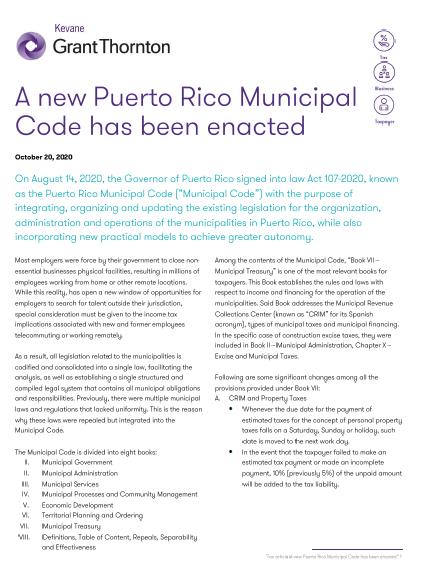-
Financial statements audits
Financial statement audits
-
Compliance audits
Compliance audits
-
Compilations and reviews
Compilations and audit
-
Agreed-upon procedures
Agreed-upon procedures
-
Corporate and business tax
Our trusted teams can prepare corporate tax files and ruling requests, support you with deferrals, accounting procedures and legitimate tax benefits.
-
International tax
Our teams have in-depth knowledge of the relationship between domestic and international tax laws.
-
Tax compliance
Business Tax
-
Individual taxes
Individual taxes
-
Estate and succession planning
Estate and succession planning
-
Global mobility services
Through our global organisation of member firms, we support both companies and individuals, providing insightful solutions to minimise the tax burden for both parties.
-
Sales and use tax and indirect taxes
SUT/ VAT & indirect taxes
-
Tax incentives program
Tax incentives program
-
Transfer Pricing Study
The laws surrounding transfer pricing are becoming ever more complex, as tax affairs of multinational companies are facing scrutiny from media, regulators and the public
-
Business consulting
Our business consulting services can help you improve your operational performance and productivity, adding value throughout your growth life cycle.
-
Forensic and investigative services
At Grant Thornton, we have a wealth of knowledge in forensic services and can support you with issues such as dispute resolution, fraud and insurance claims.
-
Fraud and investigations
The commercial landscape is changing fast. An ever more regulated environment means organizations today must adopt stringent governance and compliance processes. As business has become global, organizations need to adapt to deal with multi-jurisdictional investigations, litigation, and dispute resolution, address the threat of cyber-attack and at the same time protect the organization’s value.
-
Dispute resolutions
Our independent experts are experienced in advising on civil and criminal matters involving contract breaches, partnership disputes, auditor negligence, shareholder disputes and company valuations, disputes for corporates, the public sector and individuals. We act in all forms of dispute resolution, including litigation, arbitration, and mediation.
-
Business risk services
We can help you identify, understand and manage potential risks to safeguard your business and comply with regulatory requirements.
-
Internal audit
We work with our clients to assess their corporate level risk, identify areas of greatest risk and develop appropriate work plans and audit programs to mitigate these risks.
-
Service organization reports
As a service organization, you know how important it is to produce a report for your customers and their auditors that instills confidence and enhances their trust in your services. Grant Thornton Advisory professionals can help you determine which report(s) will satisfy your customers’ needs and provide relevant information to your customers and customers’ auditors that will be a business benefit to you.
-
Transaction advisory services
Transactions are significant events in the life of a business – a successful deal that can have a lasting impact on the future shape of the organizations involved. Because the stakes are high for both buyers and sellers, experience, determination and pragmatism are required to bring deals safely through to conclusion.
-
Mergers and acquisitions
Globalization and company growth ambitions are driving an increase in M&A activity worldwide as businesses look to establish a footprint in countries beyond their own. Even within their own regions, many businesses feel the pressure to acquire in order to establish a strategic presence in new markets, such as those being created by rapid technological innovation.
-
Valuations
We can support you throughout the transaction process – helping achieve the best possible outcome at the point of the transaction and in the longer term.
-
Recovery and reorganization
We provide a wide range of services to recovery and reorganisation professionals, companies and their stakeholders.
On August 14, 2020, the Governor of Puerto Rico signed into law Act 107-2020, known as the Puerto Rico Municipal Code (“Municipal Code”) with the purpose of integrating, organizing and updating the existing legislation for the organization, administration and operations of the municipalities in Puerto Rico, while also incorporating new practical models to achieve greater autonomy.
Most employers were force by their government to close non-essential businesses physical facilities, resulting in millions of employees working from home or other remote locations. While this reality, has open a new window of opportunities for employers to search for talent outside their jurisdiction, special consideration must be given to the income tax implications associated with new and former employees telecommuting or working remotely.
As a result, all legislation related to the municipalities is codified and consolidated into a single law, facilitating the analysis, as well as establishing a single structured and compiled legal system that contains all municipal obligations and responsibilities. Previously, there were multiple municipal laws and regulations that lacked uniformity. This is the reason why these laws were repealed but integrated into the Municipal Code.
The Municipal Code is divided into eight books:
- Municipal Government
- Municipal Administration
- Municipal Services
- Municipal Processes and Community Management
- Economic Development
- Territorial Planning and Ordering
- Municipal Treasury
- Definitions, Table of Content, Repeals, Separability and Effectiveness
Among the contents of the Municipal Code, “Book VII – Municipal Treasury” is one of the most relevant books for taxpayers. This Book establishes the rules and laws with respect to income and financing for the operation of the municipalities. Said Book addresses the Municipal Revenue Collections Center (known as “CRIM” for its Spanish acronym), types of municipal taxes and municipal financing. In the specific case of construction excise taxes, they were included in Book II – Municipal Administration, Chapter X – Excise and Municipal Taxes.
Following are some significant changes among all the provisions provided under Book VII:
- CRIM and Property Taxes
- Whenever the due date for the payment of estimated taxes for the concept of personal property taxes falls on a Saturday, Sunday or holiday, such date is moved to the next work day.
- In the event that the taxpayer failed to make an estimated tax payment or made an incomplete payment, 10% (previously 5%) of the unpaid amount will be added to the tax liability.
- Municipal Taxes
- The definition of the term “gross income” was amended to exclude: “the profit generated in the sale of personal and real assets not related to the business operations”.
- In those cases where more than one business is located within the same municipality under the same employer identification number, the person may request permission from the municipality to be considered as having a single business.
- In the event that business operations are carried out in two or more municipalities, where one of the activities has no volume of business, the computation of the municipal license tax must be made by prorating the volume of business reported, taking as a basis the average number of square feet of the areas of the buildings used in each municipality.
- A cease of operations will be considered temporary if it is for 5 years or less.
After years in the making, the municipalities have finally achieved a simplified guideline to follow. The municipalities are confident that this is a new and great opportunity to promote the economic development, improve the quality of the services rendered to taxpayers and to be updated within the global changes.


